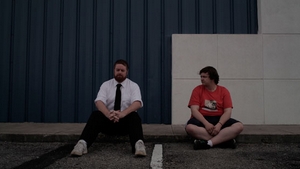 In a small town cinema, three friends/employees find themselves on the cusp of something bigger; a baby, an undergrad degree and a better job. Yet all are faced with the same question. Do they stay where they are or brave the unknown and take a chance outside the walls of the Cinema Six?
In a small town cinema, three friends/employees find themselves on the cusp of something bigger; a baby, an undergrad degree and a better job. Yet all are faced with the same question. Do they stay where they are or brave the unknown and take a chance outside the walls of the Cinema Six?
Go,See,Talk sat with writer/director duo Mark Potts and Cole Selix to talk about their film and find out more about the trio running the cineplex. For those not familiar with it, check out the trailer below as well as the highlights from our interview…
Note: We put up the family friendly trailer which is actually funnier than the real trailer due to the dubbing of the curse words. There’s also an in-video link to see the original trailer.
——————————————————————————————————————————————-
– Cinema Six seems like a coming of age film, but not really as the leads are all in sort of different points in their lives. So what would you classify this as?
If there’s anything we’ve learned from our lives and from our friends around us, is that there isn’t an age where you’re suppose to figure out what your life is all about. It can really come at any time. So in that respect, it is a coming of age film. But it’s also about guys and the friendships they have and how friends can say the things you really need to hear.
– What was the inspiration for Cinema Six? Personal experiences? Films you were fond of?
We worked at a movie theatre for a little over two years in Enid, Oklahoma. Much of the theatre-based stuff was taken from those experiences. The “red twisty” scene was a real conversation I (Mark) had with a customer. Cassie’s idea for what to do when she was fired was something a friend of ours always threatened to do if he were fired. Also, Gabe is pretty much how Mark use to be.
– Cole, you cracked me up every time you wanted to see Kane and Mark you made Gabe’s character highly likable with his sort of charming incompetence. So what’s it like being behind the camera (both as writes and directors) and in front of it?
Again, that’s just second-nature to us now. We’ve always acted in our stuff and we really enjoy doing it. On Cinema Six, though, we had more freedom not to worry since we had an incredibly great crew that would make everything look amazing. When it was just us, we’d have to have a friend who didn’t really know how to use a camera run it and it often turned out poorly. But our crew made this film as good as it is and gave us to freedom to enjoy acting instead of worrying about the camera.
– Cinema Six has a lot of outlandish dialog and profanity. Some of it has that sort of Jonah Hill obscene spontaneity. But as that makes it kind of a hard-edged film, how do you feel that might limit your audience? Further who is your target audience?
That’s how we talk when we’re around one another. The dialog changes when Mason is around his wife or when they are out in public as well. But when they’re at the theatre amongst friends and co-workers, that’s when things get profane and that’s how we are. The idea that Mason needs to stop swearing so much or his kid will learn it is very true for Cole since he has kids.
(Mark Potts: And for me. When Cole’s son Xander was around the age of two, I said “shit” in front of him and a few minutes later, he said it back.)
Of course, we know that might turn people off. There are some ridiculous and vulgar things said, but we’re trying to be outlandish about it and funny. Ultimately, we hope people can laugh at the vulgarity but not impede the story and these guys’ issues with life.
We’re hoping everyone can find something from this movie, as cliched as that sounds. We staggered the main characters’ age because, as we said before, we think people can discover what to do with their lives at any age.
– Barry Corbin brought some real weight to the film in a very short amount of time. He kind of stole the movie and it was hysterical hearing him talk about a “sex swing”. What was it like working with him and did he have problems with his dialog?
Barry Corbin is probably one of the coolest guys we know. We were incredibly nervous about working with him but he showed up to set and was just calm, cool, and making jokes with us. We sat down and talked to him about Roger, his character. That was the ice-breaking moment, just being able to talk about character and the story. After that, we felt good around him and weren’t nervous (as much.)
He didn’t have problems with anything in his dialog. In fact, we told him he could have fun with the dialog and he certainly did. He loved the sex swing line and had a lot of fun with it. And the queso stuff at the end of the scene was all him. None of that was in the script. We have an alternate take where he talks about that queso for about 30 seconds and it took everything we and the crew had to not crack up.
Afterward, he sat around with us and talked about his filmmaking experiences and it was one of the best moments we’ve ever had making a movie. He’s a great actor and a great person.
– I have to give you two kudos for crafting an impressive tapestry of vulgarity, some terms I truly never thought I’d hear in a film. Was much of it scripted or did you let the actors just wing it to see what they could come up with? And how was it possible to keep a straight face when most of it was being said?
First, thank you for that amazing compliment. Much of the vulgarity was scripted, but we also told actors to have fun with the lines and if they had other ideas for things to say, to go that route and we’d see what happened. So everyone got to have fun with that. Our crew even threw in suggestions and we tried those out. Keeping a straight face isn’t easy. We cracked up often but the pressure of a short shoot kicked in usually after two or three busted takes and we got threw it. We do have to give Brand Rackley credit for never cracking. Not once.
– There was a very surprising cameo at the end [name withheld to heighten suspense for Festival viewers]. What’s the story with him? Personal friend? Did he just love the script? Do tell…
Unfortunately, we can’t talk about this yet. We’re waiting to here what we can and can’t say about him being in the film.
– What does Cinema Six lead to next? With all the subliminal (radio ads and posters) and flat out plugs for Kane, does this mean we’ll see a feature length “Kane in 3D” film?? Anything else on the horizon?
We have the idea for Kane in 3D ready to go, but it’ll cost a lot of money. Like at least $80 million. But the idea is to remake Citizen Kane in such a way that people will never want to really remake it. Our remake will make people say, “Well, we’re never touching that.” So we want to protect Citizen Kane by destroying it. If anyone else loves the film as much as we do, write a check and do your part to save it.
——————————————————————————————————————————————-
The 2012 Dallas International Film Festival runs from April 12th to April 22nd. Click here to find show times for Cinema Six.
Go,See,Talk would like to thank the Dallas Film Society and Mark Potts and Cole Selix for their help and time in setting up this interview. You can click the following link to read the featured story of “Cinema Six” for the 2012 DIFF.




One Comment
Julie Hagen
This film captured the essence of working in a movie theater in small town Oklahoma! I swear I worked for that same theatre-owning couple. The lunatics running the asylum. Perfect!